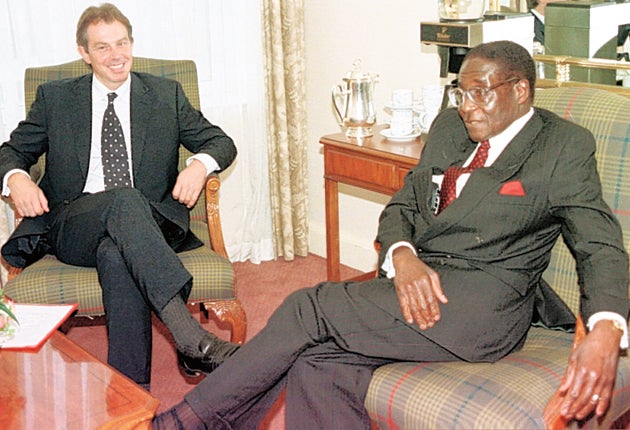Blair secretly courted Robert Mugabe to boost trade

Your support helps us to tell the story
From reproductive rights to climate change to Big Tech, The Independent is on the ground when the story is developing. Whether it's investigating the financials of Elon Musk's pro-Trump PAC or producing our latest documentary, 'The A Word', which shines a light on the American women fighting for reproductive rights, we know how important it is to parse out the facts from the messaging.
At such a critical moment in US history, we need reporters on the ground. Your donation allows us to keep sending journalists to speak to both sides of the story.
The Independent is trusted by Americans across the entire political spectrum. And unlike many other quality news outlets, we choose not to lock Americans out of our reporting and analysis with paywalls. We believe quality journalism should be available to everyone, paid for by those who can afford it.
Your support makes all the difference.Tony Blair secretly courted Robert Mugabe in an effort to win lucrative trade deals for Britain, it has emerged in correspondence released to The Independent under the Freedom of Information Act. The documents show that the relationship between New Labour and the Zimbabwean President blossomed soon after Tony Blair took office in Downing Street.
Just weeks after the Government unveiled its ethical foreign policy in May 1997, the British PM wrote a personal letter to Mr Mugabe congratulating him on his role in unifying Africa and helping to improve relations between the continent and Britain. The signed message, which welcomed Mr Mugabe's appointment as leader of the Organisation of African Unity, paved the way for an attempt to bring the two leaders together in a face-to-face meeting in Downing Street during the first weeks of the New Labour administration.
Revelations about Labour's early links with Mr Mugabe come as Mr Blair prepares to publish his autobiography in which he casts himself as a force for good in world affairs.
But the secret documents show how, despite international condemnation of Mr Mugabe's regime, Labour was secretly negotiating to establish close trading and political relations with Harare. At this time, Mr Mugabe was under growing pressure to accept responsibility for "crimes against humanity" in which thousands of Matabeleland civilians were killed by the Zimbabwe army's Fifth Brigade in 1983-87.
Proof of President Mugabe's intent came in October that year when the two leaders finally met at the Commonwealth summit in Edinburgh. Mr Mugabe told Mr Blair that he wanted Britain to fund his land reforms in which half a million hectares of white-owned farmland were to be redistributed among black farmers.
But, weeks earlier, a Foreign Office briefing to Mr Blair argued the advantages of meeting the African President outweighed human rights concerns.
In a letter dated 11 June the Foreign Office urged the Prime Minister to accede to Mr Mugabe's request for an official visit to Downing Street. The memo reads: "This may be a useful opportunity for an exchange of views in advance of CHOGM [the Commonwealth Heads of Government Meeting]. After South Africa, Zimbabwe is the most important country in southern Africa to us both commercially and politically. Despite domestic criticism arriving from recent financial scandals, and his failure so far to respond to renewed serious allegations by Zimbabwean NGOs of his involvement in atrocities in Matabeleland in the early 1980s, Mr Mugabe remains a senior African and Commonwealth figure with whom there would be advantage in establishing early close relations. We recommend that the Prime Minister sees him if his programme permits."
No 10 wrote back to the Foreign Office saying that Mr Blair could not make the date suggested by Mr Mugabe. A second Foreign Office letter later urges Mr Blair to hold the meeting in September. But this time Mr Blair's commitments prevented the two leaders meeting.
In the run-up to the Commonwealth conference, Mr Mugabe was optimistic about forging closer ties with Britain. "I have great hopes of Tony Blair," he said. "Mrs Thatcher described me as a terrorist but Tony Blair is different."
How it all changed
Mugabe on Blair
2000: Blair's administration is "the gay government of the gay United Kingdom" after Peter Tatchell attempted a citizen's arrest on him
October 2005: "The voice of Mr Bush and the voice of Mr Blair can't decide who shall rule in Zimbabwe, who shall rule in Africa, who shall rule in Asia, who shall rule in Venezuela, who shall rule in Iran, who shall rule in Iraq."
March 2010: "Conservatives are bold, Blair and Brown run away when they see me, but not these fools, they know how to relate to others. We have a better chance with David Cameron."
Blair on Mugabe
2001: "True democracy, no more excuses for dictatorship, abuses of human rights; no tolerance of bad governance, from the endemic corruption of some states, to the activities of Mr Mugabe's henchmen in Zimbabwe."
March 2002, on Mugabe's treason charges against Morgan Tsvangirai: "I think most people realise that these types of charges that are being put up there in the course of an election campaign are deeply, deeply suspect and the truth is that Mugabe is prepared to do virtually anything in order to cling on to power.
July 2009: "I think whoever has the possibility should topple Mugabe – the man has destroyed his country, many people have died unnecessarily because of him."
Join our commenting forum
Join thought-provoking conversations, follow other Independent readers and see their replies
0Comments